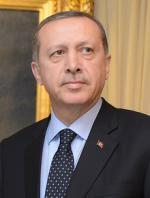Disable ads!
Recep Tayyip Erdogan
This article is part of a series on Recep Tayyip Erdoğan Early life and career · Electoral history First cabinet · Second cabinet · Third cabinet Civil–military ties · Foreign policy · Foreign trips · 2023 vision · 2013 protests in Turkey · 2013 corruption scandal in Turkey Gallery: Picture, Sound, Video Recep Tayyip Erdoğan ( listen (Turkish pronunciation: [ɾeˈd ʒep tɑjˈjip ˈeɾdoɰɑn];[note 1] born 26 February 1954) is the 12th and current President of Turkey, in office since 2014. From 1994 to 1998 he was the Mayor of İstanbul, and from 2003 to 2014 he served as the 36th Prime Minister of Turkey. He founded the Justice and Development Party (AKP) in 2001, leading it to three general election victories in 2002, 2007 and 2011, before stepping down as party leader upon his election as President in 2014. Ideologically claiming to be a moderate Islamist, his administration has overseen liberal economic and socially conservative policies. Erdoğan was a semi-professional footballer, playing for Kasımpaşa between 1969 and 1982, before being elected Mayor of İstanbul from the Islamist Welfare Party in 1994. In 1998, he was banned from office and sentenced to prison for 10 months after reciting a religiously discriminatory poem in Siirt. In 2001, he founded the conservative AKP, winning the 2002 general election with nearly two-thirds of the seats in parliament. Abdullah Gül became Prime Minister of the first single-party government since 1987. Erdoğan became Prime Minister in March 2003 after Gül’s government annulled his political ban. As Prime Minister, Erdoğan is known for his negotiations for Turkey’s accession to the European Union, an economic recovery following a financial crash in 2001, an allegedly Neo-Ottoman foreign policy, a peace process with PKK separatists, and two successful referendums on constitutional reform in 2007 and 2010. Projects such as Marmaray and two high-speed train networks were completed as part of Erdoğan’s 2023 vision for the centenary of the establishment of the Turkish Republic in 1923. With support from exiled cleric Fethullah Gülen's Cemaat Movement, Erdoğan was able to curb the political power of the pro-secular military through the controversial Ergenekon and Sledgehammer court cases. In contrast, child poverty rose to 63.5%, and Turkey suffered the highest number of workers' deaths in Europe, with 301 miners killed in Soma in 2014. Nationwide protests broke out against Erdoğan’s rule in 2013 and 2014. An internationally criticised crackdown on protestors by the police and AKP youth members led to 22 deaths, resulting in Gülen withdrawing support from the AKP and EU ascension talks stalling. A 100 billion government corruption scandal in 2013 led to arrests of Erdoğan's close allies, with Erdoğan calling the subsequent investigation a coup attempt led by a 'parallel structure' formed from Gülen's supporters. His government responded with controversial reforms to the judiciary and security forces. Turkey blocked Twitter and YouTube after Erdoğan was incriminated in a recording released on the Internet. Although the judiciary annulled the ban, Erdoğan’s government came under continued fire for media censorship, electoral fraud, the illegal construction of the world's largest palace on protected forest land, and disregard for the constitution and the rule of law. His critics and political opposition have branded him a dictator while some media outlets named him authoritarian. Erdogan was named as the AKP candidate for the 2014 presidential election on 1 July, which he won with 51.79% of the vote. He was sworn in as the 12th President of Turkey on 28 August, with speculation that he would continue to pursue his political agenda while his new Prime Minister, Ahmet Davutoğlu, would take a docile approach.
 Read more on wikipedia.org Read more on wikipedia.org
 All quotes by Recep Tayyip Erdogan All quotes by Recep Tayyip Erdogan
 Edit Edit
|

|
|
|
|
|
Background photo by Giuliana
|